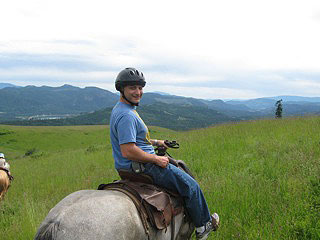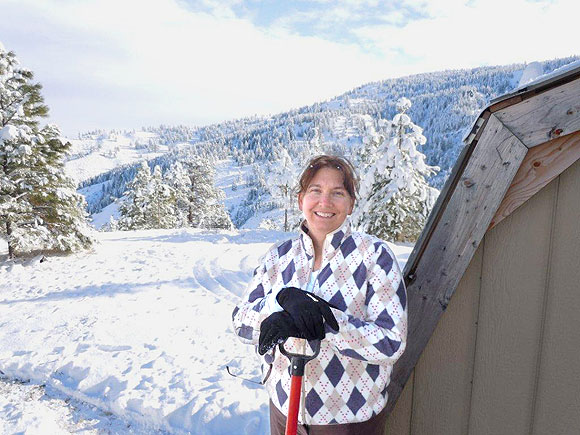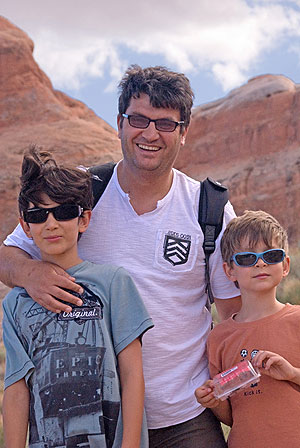REDMOND, Wash. – April 16, 2012 – New models of Windows Phone will be equipped with LTE (long-term evolution) capabilities, thanks to a small team of engineers at Microsoft. The Windows Phone Customer Experience Engineering (CXE) team recently finished a project that makes Windows Phones on the AT&T network, such as the new Nokia Lumia 900 and HTC Titan II phones announced last week, LTE-capable.

April 10, 2012
Mark Leiter, a senior program manager, enjoys snowboarding, mountain biking and horseback riding with his family.
Not many U.S. cities in the AT&T network currently have LTE service, but Microsoft and its partners are staying ahead of customer demand. That’s what the Windows Phone CXE team is all about: creating leading-edge mobile technology before customers need it, and laying the foundation for new applications and functionality that even they can’t predict.
“We can see some things we know will happen because of LTE, and some other great uses we think are likely, but the most exciting things are what we haven’t thought of yet,” says Mark Leiter, a senior program manager. “Having a great ecosystem of application developers will let people make use of this high-speed data in ways we haven’t even imagined. That’s exciting.”
Leiter and his teammates aren’t slowing down, however; they’re already planning their next release.
“We’ve transitioned to the next release beyond LTE,” he says. “We’re planning that now, and determining what to include from a functional perspective, and talking about the exciting things we can add to Windows Phone in the future.”
Microsoft News Center (MNC) recently sat down with Leiter and two of his team members, Kathy Davis and Daniel Pravat, to talk about Windows Phone, LTE and life in general—inside and outside Microsoft.
Leiter’s role on the Windows Phone LTE project was to manage partner engagement and keep everything on schedule. When he’s not working, Leiter prefers to spend time with his wife and two children, an 8-year-old daughter and 5-year-old son. He also enjoys snowboarding and mountain biking.

April 10, 2012
Kathy Davis, a senior software design engineer in test, at the cabin she and her family built in the mountains near Wenatchee, Wash.
Davis, a senior software design engineer in test, likes to retreat to a small cabin that she and her family built on 80 acres they own in the mountains near Wenatchee, Wash. “It’s very remote: there’s no electricity, no water, and in the winter the only way you can get there is to hike about a mile through the snow,” she says. “We escape there as much as possible. It’s really relaxing to get away, have a lot of down time, and be forced to forget about checking email.”
Pravat, a principal development lead, is originally from Romania. Away from work, he spends most of his free time with his wife and two sons, ages 13 and 9, and volunteers at their school. When the weather is good, Pravat likes to ride his motorcycle and go hiking or backpacking with his family. “This summer, we will try to enjoy as much time as possible outdoors,” he says. “The nature is great here.”
MNC: How will having mobile phones with LTE capability change the world?
Leiter: We’re all on a path, progressing toward ubiquitous high-speed data access everywhere we go, so essentially our mobile devices are no longer limited by the data pipe, and that includes phones, tablets, anything mobile. It enables some really cool scenarios for what people can do with communication.
If you provide the data, people will figure out a way to use it. When 3G first came out, offering much faster data than we had seen previously, the devices and applications evolved to make use of the new groundwork that had been provided.
Davis: Exactly, and because LTE is a completely different infrastructure, you can get more people on the same bandwidth but share it out better. Eventually, you won’t need an Internet line into your house anymore. You’ll be able to do everything on your phone, wherever you are, and not be tied down at all. That’s where it’s leading.
Pravat: Our work is helping other companies to create a richer ecosystem. Basically, for every user our platform will have more sophisticated things to offer.
MNC: What was the coolest or most surprising thing you learned during your work on LTE?

April 10, 2012
Daniel Pravat, a principal development lead, with his sons, ages 13 and 9.
Pravat
: I think the coolest thing is the performance you can achieve on small devices, seeing that a cell phone is capable of providing higher bandwidth and a faster Internet than I can dream of having at home. It’s amazing.
Davis: I think the most surprising thing is that this is all so new, even the simulator companies didn’t have everything ready. They came to Microsoft and we worked side by side with them to bring up our phones and their simulators at the same time. That was pretty cool.
When we started this project, AT&T only had live LTE networks in a few places, such as Dallas and Baltimore, and they were all pretty far away. So we had no way to test LTE devices here in Redmond. The simulator companies had some LTE options, but they didn’t provide all possible test scenarios so we had to do some live testing as well. We chose Dallas as our test area, and we rotated testers in and out. We were able to camp out at the Microsoft Las Colinas office and make use of their facilities.
Leiter
: I think the most surprising thing, and probably the biggest challenge, was that we had an excessive number of variables in the development of this project. Delivering on LTE was essentially a new space for our chip providers, our hardware providers, our OEM partners and our operator partners. Basically, it was a new space for everyone involved, so everyone was learning. There was no stable point anywhere. Variables all around us. That was the challenge going in.
Our team reacted to that pretty quickly and realized that we needed to collaborate closely with all of our partners and, essentially, to work on parallel paths to get this done on time. That was one of the most interesting things about the project; it seemed like all of our partners realized that and rallied together to get it done. It’s true that you can get a lot more done working well with others than you can trying to do something on your own, and I think we proved that.
MNC: It sounds like teamwork was very important for this project.
Leiter: Definitely. Teamwork both inside and outside Microsoft was critical. That’s the feedback I provided to all our partner teams. We were able to work very closely together and very well, in real time all across the company. That’s not an easy thing to do, so we appreciate all the teamwork that our partner companies demonstrated.
We all had to help each other in ways we typically don’t. Our team was providing feedback on the simulator, helping the operator with issues on the network, and assisting the silicon providers with issues in their modem. We really had to help validate the entire system, as opposed to just a product in the portion of the system that Microsoft owns.
Pravat: An effort like this is a collaboration between many companies. We needed to go even beyond the team structure to be able to work efficiently across many companies. Obviously, we did a lot of coordination so we were all on the same page, had common goals, and shared a common cause.
Some people were testing, some were doing development work, and we had to keep everything in sync and understand what’s working and what isn’t, what has been done and what still needs to be done. The boundaries between the various groups were a bit more flexible on this project. Almost like a startup.
You don’t have the time to plan everything two years in advance; you have to make decisions based on changes and new developments. The team had to stand by this decision; everybody was extremely flexible. That aspect was very important.
MNC: Did you encounter any other big challenges with this project?
Leiter: As Kathy said, we didn’t have a live LTE network in Redmond, so we had to develop a combination of test infrastructures. We also had people who had to travel frequently to areas where a live LTE network was available. But in the early phase of the project, it sometimes wasn’t available from a production-network perspective because it couldn’t always provide everything we needed. So after traveling all that way to execute tests, the network might be unavailable and the tests impossible.
That was a big hurdle we had to tackle, because at the point when we started this project we hadn’t ever initiated a Windows Phone project without a readily available production network from one of the U.S. operators. For this project there was no network locally, so a lot of people had to think outside the box to come up with new ways to validate the products we developed.
MNC: If you could have any super power, what would it be?
Davis: Maybe the ability to stop time. That would be great, because it seems there is never enough time in the day to get your work done, spend time with your family, and do the other things you know you need to do, like go to the gym. That’s what I would want.
Leiter: I would like to live forever [laughs]. I know it sounds silly, but you basically know you’re going to have enough time to become an expert in everything. Whether it’s music or language or whatever you want to do, you know you’ll have enough time to get it done.
MNC: What temptations are hardest for you to resist?
Davis: Junk food [laughs]. Chocolate, Mountain Dew, chips; all that stuff they have in the machines here at Microsoft. And just kind of vegging out in front of the TV once in a while when I really shouldn’t.
Leiter: At work there’s always the temptation to stick with what’s most comfortable, so I try to force myself to resist that and intentionally work in areas that are challenging. I do this in my personal life, too. Until a few years ago, I had spent most of my life in Florida. Then I got the opportunity to work at Microsoft. This area was completely new, the people were different, the whole culture and environment were different, but we took that on.
I think that’s the biggest temptation—to stick with the status quo, with what makes you comfortable—but that limits what you can experience in life.
Pravat: The smell of fresh espresso.
MNC: What do you enjoy most about working for Microsoft?
Leiter
: I think the biggest thrill is when you get to see people using your product in their daily lives. What is more important to most people at the end of the day than their mobile phones? There are very few companies where you can write software and impact this many people. That’s what makes working here exciting for me.
Davis: For me, it’s the variety of things I get to do in my job. We went from working on LTE to working with companies in China to bring a Windows Phone to that country. There’s something new and exciting all the time. That’s what I like about it.
Pravat: I’ve been here 12 years and other people have asked me the same question: What motivates you to come to work at Microsoft every day? I think we have an opportunity at Microsoft to do big things. The type of work we do here cannot be done in many other places.
I’ve had some great leaders here. They helped me shape myself and understand when to accept a challenge and when to say no. I learned that trying to always do the right thing is sometimes painful and sometimes risky, but in the end it’s always worth it. Working for a company allows me to do all this is very rewarding.




